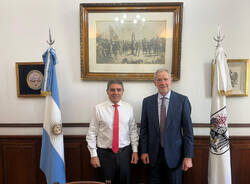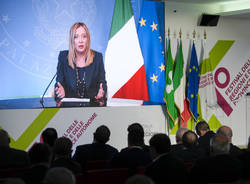The Swiss recipe for young people and work. “Having your first job at the age of 30 is late”
The CEO of SUPSI, Franco Gervasoni, talks about the university’s first 20 years, and the challenges for the future, with an eye to Italy.

“Asking the right question is often more important than finding an answer. What is missing is the mental structure for asking good questions.”
SUPSI is 20 years old, and has been inspired by the philosophy that “only doubt leads to true knowledge.”
Franco Gervasoni witnessed the founding of the Scuola Universitaria Professionale della Svizzera Italiana (SUPSI – the Professional University in Italian Switzerland), and today, he is the CEO of the university.
The labour market, changes, training and production companies are some of the topics covered in the interview that you can read and listen to here.
The Swiss model
Gervasoni said, “We train for the labour market, and companies are happy to hire young people that have studied here.” The SUPSI system is integrated into the territory and is at the service of local businesses; it is no coincidence that 80% of its 7500 graduates work in Canton Ticino. The relationship with business is so constant, that there is a common thread that links each course: the close link between education and the world of work.
Thus, the Swiss model entails “interpenetration in a myriad of different forms”, which range from parallel training to practical activities during the courses, to projects in companies and internships. On the one hand, these experiences “enable students to understand what the world of work is and what its needs are”, and it is useful for the school in order “not to lose contact with this reality.”
To this method, philosophy is added: “Only doubt leads to true knowledge.” According to Gervasoni, “Asking the right question is often more important than finding an answer, which, more or less, can be found,” and “what is missing is the mental structure for asking good questions.” For this reason, “With the student, we try to develop the right way of thinking” which then leads “to curiosity about knowledge.”
The change, the challenges, including closure and digital
A university that serves the local area has to deal with a world that changes very rapidly, much faster than universities are normally able to do. And so the challenge of digitisation and information technology is one of the biggest that SUPSI is facing and that has to be approached from various aspects, from understanding how to adapt to the new capabilities of digital natives to keeping up with companies, including refresher courses for teachers. “Individual digitisation moves at supersonic speed, digitisation of schools is very slow, but when you have to figure out what to do, it’s not easy,” said Franco Gervasoni.
As if all of this were not enough, there is another element that complicates matters: politics. “We live in a world, in which the core moves in a very limited direction” while “companies look increasingly globally,” which is not the best thing for a university that seeks to “intercept what is moving globally, to make the local territory increasingly competitive.”
The prospects for Italy
In all of this, Gervasoni does not think that Italy has an easy path. The theme of basic professional training, “a dual path that begins after compulsory schooling, will accompany you for many decades”, as you try to create “a system where education and industry work together as soon as possible, because, at the age of 30, it’s late.”
But, according to the CEO of SUPSI, Italy also runs another risk, “which may have social repercussions for whole generations to come”: selection by universities. “Increasingly often, courses have fixed numbers, but the more selecting you do, the more students you find scattered among a host of disciplines that have no essential future in the production system.” And so, while “80% of young people in Switzerland have a professional qualification,” in Italy “there are 35-year-old philosophy graduates looking for their first jobs.”
TAG ARTICOLO
La community di VareseNews
Loro ne fanno già parte
Ultimi commenti
Alberto Gelosia su Ilaria Salis candidata alle europee con Alleanza Verdi Sinistra nel collegio NordOvest
lenny54 su I no vax sono tornati a colpire in provincia: imbrattati i muri della redazione di Varesenews
malauros su I no vax sono tornati a colpire in provincia: imbrattati i muri della redazione di Varesenews
Felice su I no vax sono tornati a colpire in provincia: imbrattati i muri della redazione di Varesenews
PaoloFilterfree su A Varese Salvini prova a ricucire passato e futuro della Lega, ma Bossi non c'è
axelzzz85 su A Varese Salvini prova a ricucire passato e futuro della Lega, ma Bossi non c'è














Accedi o registrati per commentare questo articolo.
L'email è richiesta ma non verrà mostrata ai visitatori. Il contenuto di questo commento esprime il pensiero dell'autore e non rappresenta la linea editoriale di VareseNews.it, che rimane autonoma e indipendente. I messaggi inclusi nei commenti non sono testi giornalistici, ma post inviati dai singoli lettori che possono essere automaticamente pubblicati senza filtro preventivo. I commenti che includano uno o più link a siti esterni verranno rimossi in automatico dal sistema.